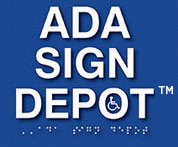Why Isn’t Accessibility a Bigger Issue in the Live Music Industry?
ADA Sign Depot
March 17, 2016

Accessibility in the Live Music Industry
Source: Flavorwire
By Matthew Ismael Ruiz
Accessibility Live Music Industry
Such was the topic of discussion at “Access Denied,” an unofficial panel discussion held Tuesday at Austin’s Beerland, during SXSW Music. Journalist Annie Zaleski (A.V. Club, Alternative Press) and DIY label owner Sean Gray (Fan Death, Accidental Guest) spoke of their experiences attending live music events and festivals with a disability, the indifference of the industry, and what bands can do to help make their shows more inclusive. The panel was not officially a part of SXSW; while it was submitted, the only panel on disability included in this year’s festival focused on how to better market products to people with disabilities.
At the heart of the plight of people with disabilities in the music industry is the subtle oppression of exclusion. Who gets to be a part of a scene? Can you still call yourself tolerant if your “safe space” is inaccessible to people with disabilities? In recounting his experience in the DC scene, Gray found himself regularly stymied by not just inaccessible venues, but a lack of information about which venues were accessible and to what degree. After losing his job, he decided to do something about it, and started Is This Venue Accessible?, a website dedicated to compiling that information.
Of course, the Americans with Disabilites Act (ADA) of 1990 helped codify the responsibility of businesses to provide access to people with disabilities. But when venues break the law, who keeps them in check? When was the last time you even thought about the accessibility of the venue you saw your last show in? The ADA has made “it really easy to sweep it under the rug,” Gray says. It’s one of the biggest problems facing advocates — if people with disabilities are often invisible to society, how do you get people to realize there’s a problem? Whose responsibility is it?
“A lot of it is on the bands,” Gray says. If even just a few popular bands with significant draw decided to only play venues that were accessible to everyone, he argues, the venue owners might actually have to do something about it. “If you have the privilege to say no,” Gray says, “you should.”
But there are a few bright spots in the abyss. Zaleski singled out Bonnaroo as one of the few festivals that goes out of its way to ensure that people with disabilities are able to join the fun. In the UK, the Attitude Is Everything campaign works to improve “deaf and disabled people’s access to live music,” and bands such as Churches, The Cure, Stevie Wonder, Franz Ferdinand, and Belle and Sebastian have all participated. And why not? Even the capitalist “Disability Inclusion for Better Business” panel understood that by excluding people with disabilities, you’re excluding a potential audience. It’s bad business and it’s morally corrupt.
“Everyone has a story about a show that changed their life,” Gray says. “What if that experience never happened because you couldn’t get into the venue?”
Shop all our Handicapped Parking ADA Signs
- Tags: The ADA and Your Business Subscribe to this blog's RSS feed.


